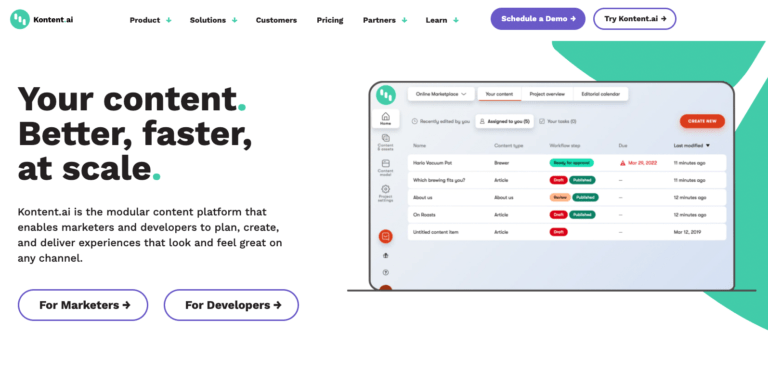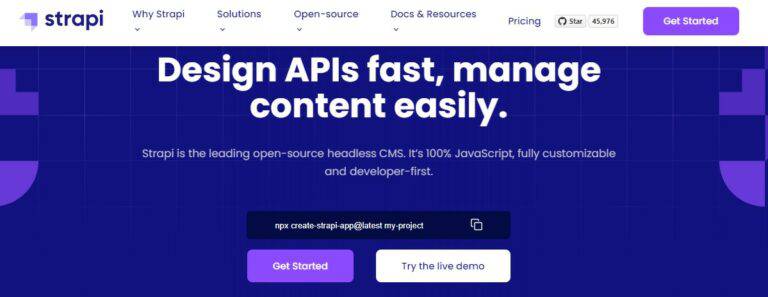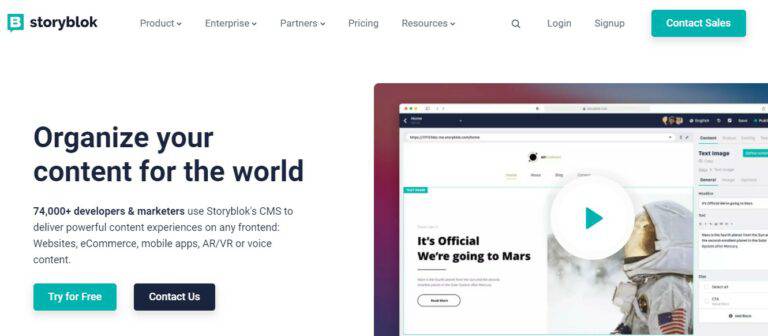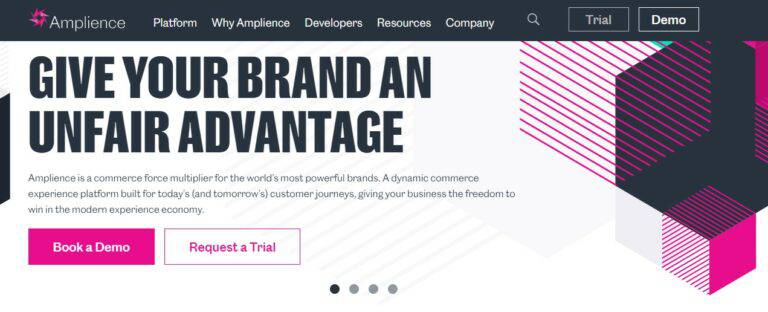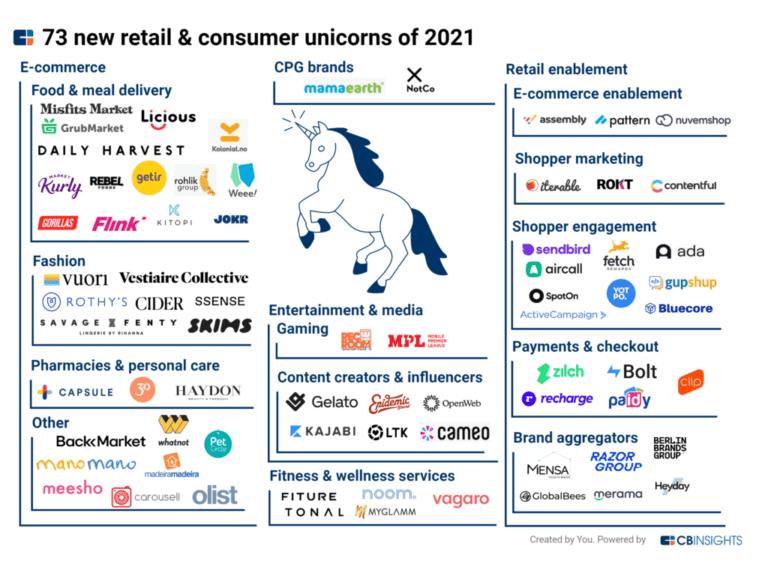
Contentful
Founded Year
2013Stage
Series F | AliveTotal Raised
$331MValuation
$0000Last Raised
$175M | 3 yrs agoRevenue
$0000Mosaic Score The Mosaic Score is an algorithm that measures the overall financial health and market potential of private companies.
-36 points in the past 30 days
About Contentful
Contentful provides a composable content platform within the digital content and experience management industry. The company offers a suite of products that enable organizations to create, manage, and deliver digital content across various channels. Contentful's solutions cater to a range of use cases including global marketing, e-commerce, support portals, and mobile applications. It was founded in 2013 and is based in Berlin, Germany.
Loading...
Contentful's Product Videos
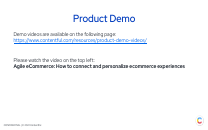
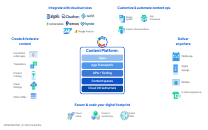
ESPs containing Contentful
The ESP matrix leverages data and analyst insight to identify and rank leading companies in a given technology landscape.
The content management systems (CMS) market offers solutions to businesses that need to manage their digital content across various channels and markets. These solutions help companies unify and orchestrate content, launch new digital experiences quickly, and provide personalized customer experiences. The CMS market addresses issues such as API and data sprawl, siloed content, slow time-to-market,…
Contentful named as Outperformer among 15 other companies, including Adobe, Salesforce, and Oracle.
Contentful's Products & Differentiators
Contentful
Our Content Platform helps companies efficiently unify, orchestrate, and deliver content across any digital channel at global scale, and integrate with any tech stack.
Loading...
Research containing Contentful
Get data-driven expert analysis from the CB Insights Intelligence Unit.
CB Insights Intelligence Analysts have mentioned Contentful in 5 CB Insights research briefs, most recently on Jul 15, 2022.
Expert Collections containing Contentful
Expert Collections are analyst-curated lists that highlight the companies you need to know in the most important technology spaces.
Contentful is included in 6 Expert Collections, including AR/VR.
AR/VR
1,505 items
This collection includes companies creating hardware and/or software for augmented reality, virtual reality, and mixed reality applications.
Unicorns- Billion Dollar Startups
1,249 items
Future Unicorns 2019
50 items
Market Research & Consumer Insights
734 items
This collection is comprised of companies using tech to better identify emerging trends and improve product development. It also includes companies helping brands and retailers conduct market research to learn about target shoppers, like their preferences, habits, and behaviors.
Digital Content & Synthetic Media
1,766 items
The Digital Content collection includes companies that use technology to create, manage, and distribute digital content under all forms, including images, videos, audio, and text, among others.
Tech IPO Pipeline
257 items
The tech companies we think could hit the public markets next, according to CB Insights data.
Contentful Patents
Contentful has filed 27 patents.
The 3 most popular patent topics include:
- content management systems
- free content management systems
- website management

Application Date | Grant Date | Title | Related Topics | Status |
|---|---|---|---|---|
8/15/2022 | 3/19/2024 | Web frameworks, Free content management systems, Content management systems, Widget toolkits, Java platform | Grant |
Application Date | 8/15/2022 |
|---|---|
Grant Date | 3/19/2024 |
Title | |
Related Topics | Web frameworks, Free content management systems, Content management systems, Widget toolkits, Java platform |
Status | Grant |
Latest Contentful News
Oct 22, 2024
Posted on Adobe (US), OpenText (Canada), Microsoft (US), Oracle (US), Automattic (US), RWS (UK), Progress (US), OpenAI (US), Canva (US), Upland Software (US), Yext (US), HubSpot (US), HCL Technologies (India), Sitecore (US), Acquia (US), Optimizely (US), Bloomreach (US), Lumen Technologies (US), Contentful (Germany), Pantheon (US), ContentStack (US). Web Content Management (WCM) Market by Product Type (Content Management (AI image generation, AI voice generation), Digital Asset Management, Content Marketing, Website Development), Architecture (Coupled, Decoupled, Hybrid) – Global Forecast to 2029. The web content management (WCM) market is projected to expand from USD 10.65 billion in 2024 to USD 24.97 billion by 2029, with a compound annual growth rate (CAGR) of 18.6% during this period. This growth is primarily driven by the increasing demand for personalized content and the widespread adoption of omnichannel marketing strategies, which require efficient content management across various platforms. Additionally, the rapid integration of artificial intelligence (AI) is transforming the WCM landscape, streamlining processes, boosting efficiency, and enabling the delivery of highly tailored customer experiences. By enterprise end user, media & entertainment is expected to hold the largest market size in 2024. Due to the increasing consumption of video streaming, digital publications, and interactive media, media companies require advanced WCM solutions to efficiently create, manage, and distribute a wide variety of content formats. Advanced WCM solutions allow media organizations to manage content workflows with maximum efficiency, offer personalized experiences, and respond rapidly to changing audience preferences. In such a competitive marketplace, engagement and loyalty of the audience require the capability to deliver personalized experiences with real-time updates. Further, advanced analytics incorporated into the WCM systems enable media organizations to understand their viewer preferences and behaviors, which can then be optimized effectively for content strategies. Continued innovation in the way people consume digital media, coupled with steadily increasing multi-channel distribution, will position WCM technology as a strategic tool for use in this industry’s pursuit of enhancing operational efficiency and revenue. By architecture, headless segment is projected to grow at the highest CAGR during the forecast period. The headless architecture provides flexibility to manage content across multiple platforms. Unlike traditional WCM systems, headless CMS decouples the creation and management of content from the presentation layer in order to deliver content through APIs to any front-end interface such as websites, mobile apps, IoT devices. Adoption of this architecture is rapidly increasing among organizations that try to deliver seamless omnichannel experiences because it empowers developers to use their preferred front-end technologies while keeping content consistency across multiple touchpoints. As businesses continue to expand their digital presence, headless CMS solutions offer the agility needed to quickly adapt to new platforms, improve time-to-market, and enhance user experiences. Europe is expected to hold the second largest market size for the estimated year. The key contributors in the Europe region are UK, France, and Germany. The region is an early adopter of advanced technologies, focusing on integration of AI, ML, NLP and digital transformation. High organizational spending on marketing campaigns, such as social media management, website optimization, and document management, is the driving force behind the demand for WCM solutions aimed at improving customer experiences. High investment by the European Union in customer engagement initiatives further propels the implementation of WCM solutions in the region.The region has a high number of WCM providers, HubSpot, Bynder, Kentico, and Contentful, thereby adding to the growth in this market. With a growing focus on web-user experience and customer relationship management, WCM solutions in Europe is expected to increase during the forecast period. Unique Features in the Web Content Management Market One of the standout features in the web content management (WCM) market is the ability to deliver personalized content. Modern WCM systems leverage data analytics and user behavior to create tailored experiences for each visitor. A key feature of advanced WCM platforms is their support for omnichannel marketing strategies. These systems allow businesses to manage and distribute content seamlessly across multiple channels, including websites, mobile apps, social media, and email. AI integration is a rapidly growing trend in the WCM market. AI-powered WCM platforms automate content creation, management, and optimization processes. This includes features like predictive content recommendations, AI-driven content tagging, and automated workflows, all of which enhance operational efficiency and help deliver more personalized customer experiences. The emergence of headless CMS architecture is another unique feature in the WCM space. Unlike traditional CMS platforms, headless CMS separates the content management backend from the front-end presentation layer. WCM solutions are designed to be highly scalable, making them suitable for businesses of all sizes. These platforms can handle growing content volumes and traffic as businesses expand. Major Highlights of the Web Content Management Market A major highlight of the WCM market is the increasing demand for personalized content. As customers expect more tailored and relevant digital experiences, businesses are adopting WCM platforms that enable the customization of content for individual users based on their preferences, behaviors, and demographics. Another significant driver in the WCM market is the rise of omnichannel marketing strategies. Businesses are seeking solutions that allow for the seamless delivery of content across various platforms and devices, including websites, mobile apps, social media, and more. The incorporation of artificial intelligence (AI) is a notable highlight in the WCM market. AI technologies are being integrated into WCM platforms to enhance automation, streamline content management processes, and improve efficiency. The adoption of headless CMS architecture is becoming a prominent trend in the WCM market. By decoupling the back-end content management system from the front-end delivery, headless CMS allows greater flexibility for developers to deliver content across multiple platforms, including websites, mobile apps, and emerging technologies like IoT. With increasing concerns about data privacy and security, WCM platforms are enhancing their security features to protect sensitive content. Modern WCM solutions offer advanced security measures such as role-based access control (RBAC), encryption, and compliance with global regulations like GDPR. Top Companies in the Web Content Management Market Key players operating in the web content management market across the globe are Adobe (US), OpenText (Canada), Microsoft (US), Oracle (US), Automattic (US), RWS (UK), Progress (US), OpenAI (US), Canva (US), Upland Software (US), Yext (US), HubSpot (US), HCL Technologies (India), Sitecore (US), Acquia (US), Optimizely (US), Bloomreach (US), Lumen Technologies (US), Contentful (Germany), Pantheon (US), ContentStack (US), WebFlow (US), Bynder (Netherlands), Kentico (Czech Republic), Storyblok (Austria), Hygraph (Germany), Strapi (France), Amplience (UK), SiteGlide (UK), Solodev (US), GX Software (Netherlands), Agility (Canada), Synthesia (US), Enonic (Norway), Squiz (Australia), Crownpeak (US), Brightspot (US), Coremedia (Germany), Kontent.ai (Czech Republic), Zesty.io (US), Magnolia (Switzerland), dotCMS (US), Dynamicweb (Denmark), Sanity (US). These companies adopt various strategies, both organic and inorganic, including new products launches, forming strategic partnerships and collaborations, and engaging in mergers and acquisitions, to expand their presence and offerings in the web content management market. Adobe offers various products and services that are used by creative professionals, including photographers, video editors, designers, and developers; communicators including content creators, students, marketers, and knowledge workers; enterprises of all sizes; and consumers for creating, managing, delivering, measuring, optimizing, engaging and transacting with compelling content and experiences across personal computers, devices, and media. In web content management market, Adobe offers Adobe Experience Manager (AEM), one of the renowned content management suites. The company has expanded its reach by collaborating with industry giants like Microsoft and NVIDIA to integrate Adobe’s solutions with their platforms, driving deeper collaboration and innovation. Microsoft holds a significant share in the web content management market. The company offers Microsoft SharePoint with capabilities that empower individuals, teams, and organizations to intelligently and securely discover, share, and collaborate to interact with and manage growing volumes of content. Microsoft has made significant strategic advancements in the web content management market by focusing on enhancing its SharePoint and Microsoft 365 platforms. Recent innovations include the integration of Copilot, which leverages AI to simplify content creation and page design, making it easier for users to develop engaging SharePoint sites. Additionally, Microsoft’s partnership with Adobe has strengthened its content management capabilities by integrating Adobe Experience Cloud workflows with Microsoft Copilot for streamlined marketing and content management. OpenText offers OpenText Web Content Management that help companies manage websites with an easy and productive process to enhance customer experiences. OpenText has made significant innovations, including the use of AI and machine learning to enhance digital experiences. For instance, OpenText announced the latest innovations in OpenText Aviator. Aviator powers AI use cases by enabling secure information management and governance across knowledge bases without requiring data migration. Media Contact
Contentful Frequently Asked Questions (FAQ)
When was Contentful founded?
Contentful was founded in 2013.
Where is Contentful's headquarters?
Contentful's headquarters is located at Max-Urich-Strasse 3, Berlin.
What is Contentful's latest funding round?
Contentful's latest funding round is Series F.
How much did Contentful raise?
Contentful raised a total of $331M.
Who are the investors of Contentful?
Investors of Contentful include Tiger Global Management, Tidemark, Base10 Partners, Benchmark, Balderton Capital and 12 more.
Who are Contentful's competitors?
Competitors of Contentful include Storyblok, Builder, Wonderz, Hygraph, Cardware and 7 more.
What products does Contentful offer?
Contentful's products include Contentful.
Who are Contentful's customers?
Customers of Contentful include Bang & Olufsen, Staples Canada, Aldo Shoes, Costa Coffee and Lichtblick.
Loading...
Compare Contentful to Competitors

Storyblok is a content management system that specializes in providing developers and marketers with tools to create and manage digital content across various channels. The company offers a headless CMS that enables seamless content management and delivery, along with visual editing capabilities and API integrations for personalized experiences. Storyblok's solutions cater to industries such as retail, technology, manufacturing, finance, and education, focusing on improving time to market, content efficiency, digital innovation, and security. It was founded in 2017 and is based in Linz, Austria.

Contentstack specializes in providing a headless, API-first content management system designed for modern digital experiences across various channels. The company offers a platform that enables the creation, management, and delivery of content to multiple platforms and devices. Contentstack's solutions cater to diverse industries, including retail, travel and tourism, financial services, and technology, with use cases such as e-commerce, localization, and personalization. It was founded in 2018 and is based in San Francisco, California.

Strapi provides an open-source headless content management system (CMS) to manage content and distribute it anywhere. Its product gives developers the freedom to use their favorite tools and frameworks while allowing editors to easily manage their content and distribute it anywhere. It was founded in 2016 and is based in Dover, Delaware.

Fabric focuses on providing commerce solutions. It offers scalable commerce platforms, order management, product information management, and marketplace services, all aimed at streamlining commerce operations and driving growth. The company primarily serves the e-commerce industry, with a particular focus on business-to-consumer (B2C) commerce initiatives. Fabric was formerly known as Yotta Digital Ventures. It was founded in 2017 and is based in Seattle, Washington.

Sitecore develops digital experience software. The company offers a software as a service (SaaS) enabled, composable platform that enables brands to deliver memorable customer interactions. It was founded in 2001 and is based in San Francisco, California.

Sanity is a company focused on providing a composable content cloud within the content management system (CMS) industry. Its main offerings include a customizable editing environment for real-time collaboration, APIs for seamless integration, and a fully decoupled backend for content storage and distribution. The company primarily caters to sectors such as e-commerce, marketing, media, and support, providing solutions that enhance operational efficiency and content experiences. It was founded in 2018 and is based in Palo Alto, California.
Loading...
